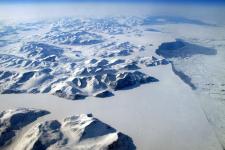Getting by in a Troubled Arctic

Less than a decade ago, the Arctic region was widely regarded as an extraordinary, peaceful region. Brought about by a combination of a harsh geography incentivising cooperation over conflict and by the commitment of the Arctic countries themselves, the region was hailed in many quarters as exceptional, a place where the traditional rules of power politics had been, if not dismantled, then at least reined in. This is no longer the case.
A new article in the journal Diplomaatia by senior researcher Mikkel Runge Olesen outlines how the Arctic is increasingly becoming home to great power rivalry between Russia, China and the US, and lays out how that affects the Kingdom of Denmark. The article finds that while the Arctic has seen increased great power rivalry stemming from both Russian, Chinese and US activity and change of approach to the region, the Arctic policy of the Kingdom of Denmark is much more affected by changes in the policies of its great power ally – the US – than by changes in the perceived threat from Russia or China.
The Kingdom’s ability to manage pressure from the great powers is further complicated by the simultaneous need to keep the Kingdom Arctic policy united at a time when the interests of the three parts of the Kingdom – Denmark, Greenland and the Faroe Islands – do not always coincide. As such, the drive for independence in Greenland and, to a lesser extent, in the Faroe Islands, necessitates building their economies to be able to do without Danish economic support.
Here, China in particular represents a potential source of new investments, while Russia is an important market for fish products. Meanwhile, the US, on its part, is deeply skeptical toward any increased Chinese influence in the Arctic and is currently pushing its allies to take steps toward increased Russian military activity in the region. And as Greenland and the Faroe Islands are increasingly taking on a more active role in formulating the Kingdom’s foreign and security policy, so too the US is increasingly choosing to interact directly with the two instead of going through Denmark. That means opportunities for Greenland and the Faroe Islands, but also exposes them more directly to the risks of great power politics.
Read the article here.
DIIS Eksperter
